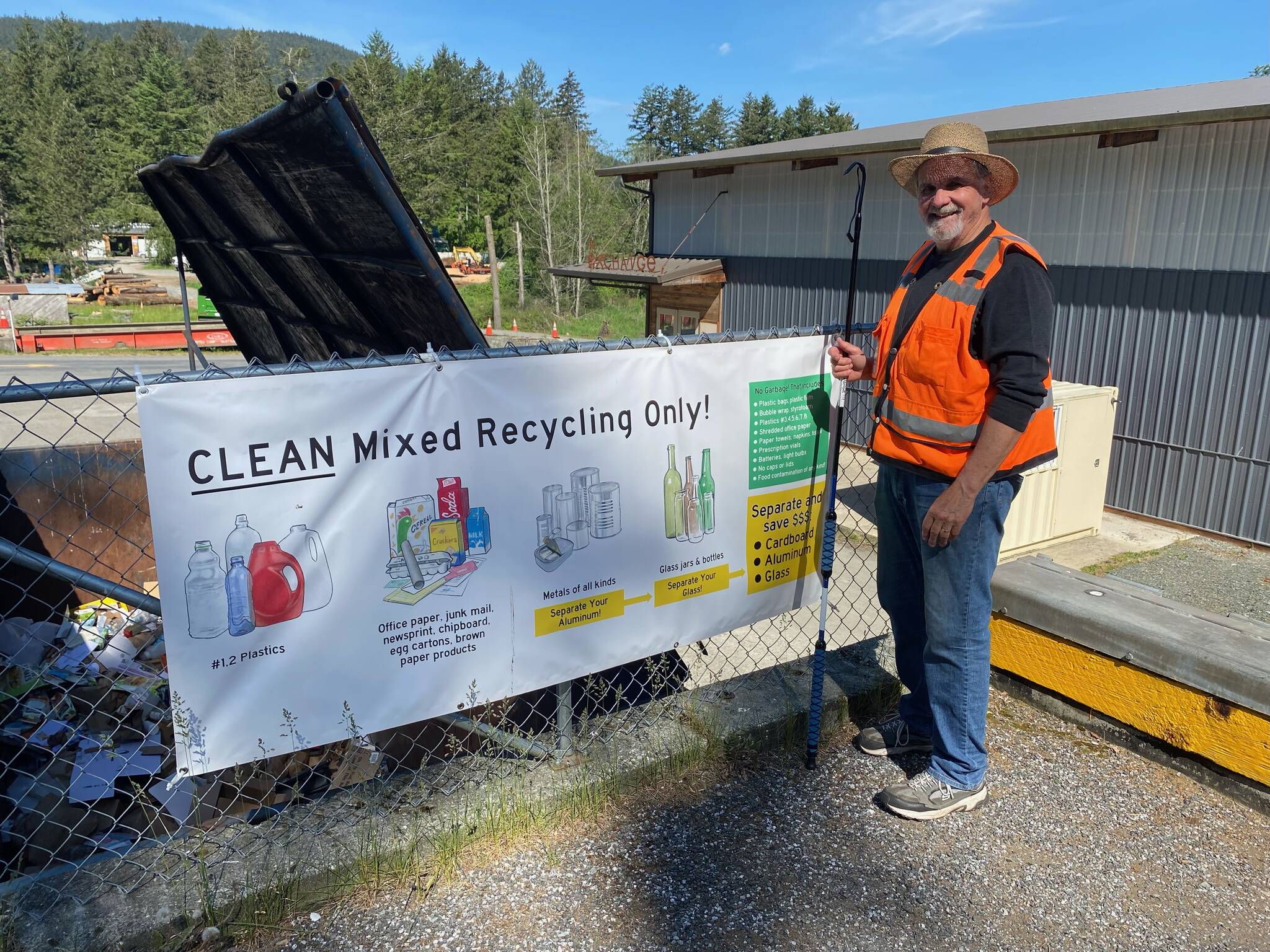by Toby Cooper
Sounder contributor
Dave Zoeller pulls into the familiar yard at Orcas Recycling Services, parks on the lower level and puts his keys in his pocket. A Bluegrass riff plays in his head as he slips into an orange hi-viz vest and picks up a 10-foot pole with a stainless gaff bolted on one end. Glancing down at the cavernous bin already half filled with “Mixed Recycling,” he suppresses the riff and begins to hook non-conforming stuff out for proper sorting.
“It’s the first thing I always do on my shift,” says Z, as he is known throughout the Orcas community. “Cardboard needs to go in the dedicated cardboard bin — not in ‘Mixed.’ Sometimes there’s outright trash. But the worst is loose plastic bags — those things gum up the whole works and render automatic sorting machines temporarily useless.”
He hooks one more cardboard box, flattens it, then greets an incoming customer who asks if glass should be sorted by color (no) and if caps should be removed (not necessary).
In fact, Z is part of a select team of like-minded individuals who volunteer at ORS as “Docents.” Their job is simple: help customers, including island residents, occasional visitors, businesses, and contractors with sorting and disposing of the various waste products we all tend to accumulate.
The only prerequisite for Docent service, it seems, is a ready smile, which makes Z eminently qualified for the job.
“We used to think of our Docents as tour guides,” says Jim “Duff” Duffield, Treasurer of the ORS Board of Directors. Duffield spearheads the four-year-old Docent program and serves multiple shifts himself throughout the year. “The goal is to help customers navigate the nuances of sorting at our facility. But they are much, much more than guides. With [Executive Director] Pete Moe and the board spending their time behind desks, the Docents have become the ‘face’ of our organization.”
Duffield and Moe agree that recycling has long been a way of life for Orcas. The Docents simply make it better. Moreover, ORS, which operates as a non-profit business entity on contract with San Juan County Waste Management Services, pursues a mission to help Orcas become a “zero waste community” in which traditional waste products can be treated as commodities on their way back into the productive economy.
However, people make mistakes or get confused when confronted with the profusion of choices for sorting trash. There are multiple kinds of plastic, all recyclable, but the question is, are all actually recycled in Washington? (No, and Z can help you understand.)
“I am a big believer that the whole system needs to change,” says Z, who equates our collective reliance on one-way plastics to an “addiction.”
To him, the weekly two-hour shifts are part of his own mission to make the world a better place.
“Come out and try it,” says Docent Heather Nelson, a relative newcomer to Orcas who saw the service as one way to make new friends in the community. “What keeps me coming back is just meeting people. One day a woman came in singing in this beautiful voice – while dumping trash! It made my whole day.”
Proper sorting at the front end of the recycling process can compel the efficiency and effectiveness of the entire operation. ORS offers big discounts for sorted items like cardboard and all kinds of glass – a benefit sometimes overlooked by customers who in turn welcome the friendly reminder from one of the Docents.
Unlike the retired Z, Nelson still works full-time. For her, the weekly shifts are a welcome break from Zoom meetings.
“I have had a lifelong commitment to the environment,” she says. “About 80% of the people I talk to are responsive and passionate about doing their best. If 20% want nothing to do with any of it, I am still happy just being here.”
Since becoming a Docent, Nelson decided to up her game. She has now signed up for a 7-week online course with Beyond Plastics, a project at Vermont-based Bennington College devoted to ending plastic pollution.
“There is a lot more we can do,” she says.
Duffield, Moe, Z and Nelson speak with one voice when it comes to the future of the Docent program.
“We need more people,” they say. “At the end of the day, this is a ‘people business.’ Two hours a week can make such a difference.”
Adds Duffield: “They are indispensable. They make good things happen every day.”



